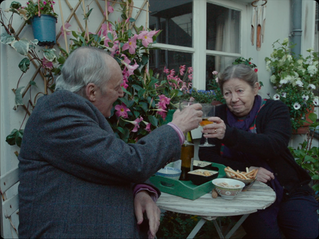Laymun
- Jonny Rogers
- Jun 10, 2022
- 2 min read
Catherine Prowse & Hannah Quinn, 2017

Produced over the course of a year, Kingston School of Art students Catherine Prowse and Hannah Quinn created Laymun in response to the conflict in Syria, though the film’s quiet simplicity affords a near ahistorical universality: this is a fable of hope persisting through humanity’s cycles of violence, as simple gestures and sensations signpost the possibility of new worlds.
Laymun’s opening sequence might impress a playful amateurism – a toyish cityscape of crumpled paper buildings, overlaid with wispy cotton smoke – but the mechanical roar of distant planes and bombs draws us into the reality of death and destruction familiar to so much of modern history.
A lone woman clutches potted plants as she emerges from the ruined city’s indigo shadows, placing one in the doorway of a family gripped by despair. She returns to her greenhouse the following morning: a sanctuary of soft white, beige and tangles of green, interspersed with bursts of yellow. She is a gardener in a warzone, protesting the surrounding violence with the careful cultivation of beauty.
Without a word, we are given her backstory in a pensive glance at a photo: she stands beside a man, smiling, young plants beneath her arm and empty pots behind. Returning to the present, the man’s absence is filled with the assumption of grief. The war continues, proceeding through the streets and alleyways until it consumes the woman’s home. Pulses of blue and white consume the screen; the paper city is ripped apart as reality is torn asunder by senseless violence.
Barely surviving, the woman takes a lemon from a fallen tree she had rested on a nearby window, before joining a queue of refugees entering a bus. Consoling the tears of a child beside her, she pulls back the peel of the remaining fruit and hands it over. Inhaling the fresh juice, the child turns to her mother and smiles as the bus pulls off.

The future is unknown, but this gesture has planted a seed of redemption in the child’s imagination. The scent of the lemon is the present experience of an unrealised future; a vibrant, ripe produce of unseen forces forming something so simple, pure and pleasant against an antithetical backdrop of chaos.
This sense is no reactionary nostalgia, at least on behalf of the child, for she may well know nothing other than the conflict which surrounds her. Rather, it is a sharp whisper of assurance that destruction does not have to have the last word; that human evil can never completely arrest the forces of life to bring forth fresh beauty.
The profundity and insight of Laymun are not undermined, but rather elucidated, by its simplicity: it is not a sensation of the exotic but the ordinary – or the gentle exoticism of the ordinary – that witnesses the possibility of a world redeemed.








Comments